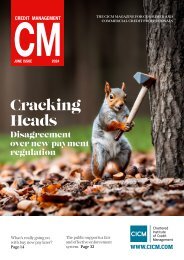Credit Management July and August 2020
The CICM magazine for consumer and commercial credit professionals
The CICM magazine for consumer and commercial credit professionals
Create successful ePaper yourself
Turn your PDF publications into a flip-book with our unique Google optimized e-Paper software.
OPINION<br />
GREAT<br />
EXPECTATIONS<br />
Essential advice from the latest<br />
<strong>Credit</strong> Managers' Playbook.<br />
AUTHOR – Chris S<strong>and</strong>ers FCICM<br />
EVERYONE is getting used to the<br />
new video calling culture of<br />
business, but despite this now<br />
becoming normal we are not<br />
getting better at it. Many look like<br />
‘Crimewatch Police Informants’ –<br />
a black silhouette on a bright background – or<br />
have given a camera to a four-year old <strong>and</strong> asked<br />
them to take a picture.<br />
We need to get a bit more savvy with this<br />
technology in the coming months, not least<br />
as recruiters will be doing more recruiting<br />
virtually <strong>and</strong> the expectation <strong>and</strong> how your<br />
boss considers you can cope with this new<br />
technology when presenting your numbers will<br />
become more important. Only having the top of<br />
your head showing in an interview or looking<br />
like a ‘no publicity’ lottery winner would be the<br />
virtual equivalent of turning up for a face-toface<br />
interview for a manager’s job wearing an<br />
‘I’m with Stupid’ t-shirt.<br />
PRODUCTIVITY AND PERFORMANCE<br />
Cash collections performance is still strong<br />
in many organisations saying that they are<br />
maintaining collections levels at between<br />
80 percent to 90 percent plus of pre-crisis<br />
levels. This excellent performance is of course<br />
a double-edged sword, with organisations<br />
considering current performance based on<br />
current costs; is 80 percent performance OK<br />
with fewer people <strong>and</strong> no building costs?<br />
The most resilient organisations are those that<br />
had already invested in automation, systems,<br />
infrastructure <strong>and</strong> training. Removing manual<br />
processes fundamentally improves resilience.<br />
Time is running out. As we start to come out<br />
of the lockdown phase into the new normal,<br />
building resilience now is critical. Let’s not<br />
forget this COVID-19 crisis may come back <strong>and</strong><br />
not all businesses will be able to survive second<br />
time round. Building resilience now is a critical<br />
business requirement going forward.<br />
NEW NORMAL?<br />
The #newnormal hasn’t been decided yet<br />
but that shouldn’t stop us from planning for<br />
whatever it is. Time is marching on <strong>and</strong> if you<br />
haven’t started to consider what this new normal<br />
will look like for your credit management teams<br />
it is getting to the point where it is almost too<br />
late. We have seen many organisations make<br />
decisions on when offices will re-open <strong>and</strong><br />
some organisations have made the decision not<br />
to go back to the office at all. Others are waiting<br />
until the end of <strong>2020</strong> <strong>and</strong> others are looking at<br />
phasing their return.<br />
<strong>Credit</strong> managers have the attention of the<br />
business leaders now, so be bold. Ask for stuff<br />
including investment in systems <strong>and</strong> processes<br />
<strong>and</strong> resources. One thing is clear: this crisis<br />
has demonstrated that many companies<br />
have historically under invested in credit <strong>and</strong><br />
collections. So, seize the day. It can take up to<br />
12 weeks for a new system to be in place so start<br />
now!<br />
To date we have held 34 CICMQ Zoom Sessions<br />
since the first one three days after lockdown<br />
started, with over 725 delegates attending<br />
from UK <strong>and</strong> International organisations.<br />
So let me share some of the thoughts <strong>and</strong><br />
recommendations of this unrivalled CICM Best<br />
Practice Network:<br />
PEOPLE AND ORGANISATION<br />
Many organisations now have a ‘Back to the<br />
Office Plan’. From a staff perspective, certainty is<br />
what is needed most. Any plan that is developed<br />
must be shared with the team. If there is one<br />
good thing that has come out of this it is that<br />
there will be a mix of working practices in the<br />
future: more flexible working, two-days a week<br />
in the office, more job swaps, <strong>and</strong> cross training<br />
will all be required in smaller companies as<br />
the roles have to be shared. There will be less<br />
travel, less congestion <strong>and</strong> less pollution. Asking<br />
what the team want to do <strong>and</strong> their personal<br />
circumstances has to be the way forward.<br />
STAKEHOLDERS<br />
Build a plan or a road map for the next 12 months<br />
<strong>and</strong> articulate this to the senior leadership. This<br />
will build trust <strong>and</strong> will demonstrate that you<br />
<strong>and</strong> the team are on the case. If you haven’t<br />
done this, you may be too late as decisions<br />
are now being made potentially without your<br />
operational input.<br />
Your overriding question now <strong>and</strong> for the<br />
rest of the <strong>2020</strong> must be ‘How do I maintain<br />
the support of the senior stakeholders in the<br />
Advancing the credit profession / www.cicm.com / <strong>July</strong> & <strong>August</strong> <strong>2020</strong> / PAGE 42


















